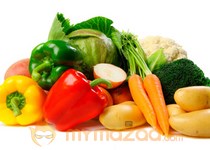An adult eating 2,000 calories a day should aim to eat about 2½ cups of vegetables daily. How much is a serving of vegetables? Here’s a quick guide to portions per serving:
Salad greens
A 1-cup serving of mesclun greens contains just 10 calories, and the same size serving of shredded romaine lettuce contains 8 calories. Mesclun greens are a better source of vitamin C (providing 5 percent of your daily value) while romaine lettuce is a better source of vitamin A (providing 81 percent of your daily value).
Carrots
A single serving of carrots is 1 cup or 12 baby carrots (about 50 calories), providing 408 percent of the daily value for vitamin A. Carrots also contain minerals such as calcium, iron, magnesium, phosphorus, potassium, copper and manganese that support healthy bones, teeth and muscle and promote energy metabolism, fluid balance and red blood cell formation.
Green beans
A 1-cup serving of cooked green beans has 44 calories and provides 17 percent of the daily value of vitamin A, 20 percent of the daily value of vitamin C, and 10 percent respectively of the daily value of folate and potassium. These nutrients are especially beneficial in protecting against cancers of the lung, gastrointestinal tract, breast, oral cavity, pancreas, uterine cervix, and ovary.
Bell peppers
One serving of bell peppers is 1 cup chopped, raw or ½ cup cooked (about 30 calories).
A cup of chopped peppers in any color provides more than 100 percent of the daily value of the antioxidant vitamin C, which supports healthy tissue and immunity. Peppers also provide folate, which is especially important for pregnant women because it helps prevent certain types of birth defects, and vitamin K, which is essential to the clotting function of blood.
Potatoes
A serving of white or sweet potatoes is ½ medium potato or ½ cup of mashed and has about 80 calories and 15 grams of carbs.
Both sweet and white potatoes provide vitamin C, niacin, folate, thiamin and vitamin B-6. The B vitamins niacin, thiamin, folate and B-6 help the body metabolize energy and keep your skin, blood cells, brain and nervous system healthy. Sweet potatoes provide about 500 percent of the daily value of vitamin A whereas white potatoes have none. Sweet and white potatoes are comparable in the minerals iron, magnesium, potassium, phosphorus, copper and manganese, which are more highly concentrated in the potato’s skin than its flesh. The skin is also a great source of fiber.
Tomatoes
A 1 cup serving of chopped, sliced, raw, canned or cooked tomato has about 32 calories or 20 cherry tomatoes, which have about 61 calories.
One cup of grape tomatoes provides up to 33 percent of the daily requirement vitamin C and a medium tomato provides at least one-third of the daily value of vitamin A. Tomatoes and tomato products offer good sources of potassium with a half-cup serving of tomato sauce providing about 10 percent of an adult's daily requirement. Tomatoes are rich in vitamin K and manganese and a medium tomato offers up to 10 percent of an adult's daily requirements for these nutrients.
Broccoli
A serving of broccoli (½ cup cooked, 1 cup raw or 10 florets) has 30 calories, 3 grams protein and 5.2 grams carbohydrates. Both the stems and florets are about the same nutritionally, providing about 150 percent of your daily value for vitamin C and about 10 percent of your daily dietary fiber needs. Broccoli florets contain significantly more vitamin A than the stalks do, however (florets provide 60 percent of the vitamin A you need each day versus broccoli stems that deliver only 8 percent of the daily value).










